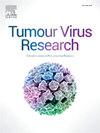The imprint of viral oncoproteins on the variable clinical behavior among human papilloma virus-related oropharyngeal squamous cell carcinomas
IF 8.1
Q1 VIROLOGY
引用次数: 0
Abstract
Human papilloma virus-related (HPV+) oropharyngeal squamous cell carcinomas (OPSCCs) are variable in their progression, immune landscape, treatment responses, and clinical outcomes. Their behavior is impacted not only by differences in host genomic alterations but also by diversity in levels and activity of HPV-encoded oncoproteins. Striking differences in HPV mRNA levels are found among HPV+ OPSCCs and likely derive in part from variations in the structurally diverse mix of integrated and episomal HPV genomes they often contain. Viral oncoprotein levels and function are also impacted by differential splicing of the two long polycistronic transcripts of HPV16, the HPV type within most HPV+ OPSCCs. Further variation in viral oncoprotein function arises from the distinct lineages and sub-lineages of HPV16, which encode polymorphisms in functionally important portions of oncogenes. Here we review the limited current knowledge linking HPV mRNA expression and splicing to differences in oncoprotein function that likely influence OPSCC behavior. We also summarize the evolving understanding of HPV16 physical genome state and genetic variants and their potential contributions to HPV oncoprotein levels and function. Addressing considerable remaining challenges in defining the quantitative and qualitative imprint of HPV oncoproteins on each OPSCC holds promise to guide personalization of therapy for this disease.
病毒癌蛋白对人类乳头瘤病毒相关口咽鳞状细胞癌不同临床表现的影响。
人乳头状瘤病毒相关(HPV+)口咽鳞状细胞癌(OPSCC)在病情进展、免疫状况、治疗反应和临床结果方面各不相同。它们的行为不仅受到宿主基因组改变差异的影响,还受到HPV编码的癌蛋白水平和活性多样性的影响。HPV+ OPSCCs的HPV mRNA水平存在显著差异,部分原因可能是它们通常包含的整合和外显子HPV基因组结构多样。HPV16是大多数HPV+ OPSCC中的HPV类型,其两个长的多聚体转录本的剪接差异也会影响病毒肿瘤蛋白的水平和功能。病毒癌蛋白功能的进一步变化来自于HPV16的不同系和亚系,它们在癌基因的重要功能部分编码了多态性。在此,我们回顾了目前将 HPV mRNA 表达和剪接与可能影响 OPSCC 行为的肿瘤蛋白功能差异联系起来的有限知识。我们还总结了对 HPV16 物理基因组状态和遗传变异及其对 HPV 肿瘤蛋白水平和功能的潜在贡献的不断发展的认识。在确定 HPV 癌症蛋白对每种 OPSCC 的定量和定性影响方面仍存在大量挑战,解决这些挑战有望为这种疾病的个性化治疗提供指导。
本文章由计算机程序翻译,如有差异,请以英文原文为准。
求助全文
约1分钟内获得全文
求助全文
来源期刊

Tumour Virus Research
Medicine-Infectious Diseases
CiteScore
6.50
自引率
2.30%
发文量
16
审稿时长
56 days
 求助内容:
求助内容: 应助结果提醒方式:
应助结果提醒方式:


